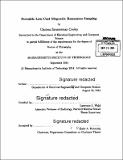| dc.contributor.advisor | Lawrence L. Wald. | en_US |
| dc.contributor.author | Cooley, Clarissa Zimmerman | en_US |
| dc.contributor.other | Massachusetts Institute of Technology. Department of Electrical Engineering and Computer Science. | en_US |
| dc.date.accessioned | 2015-01-20T17:58:55Z | |
| dc.date.available | 2015-01-20T17:58:55Z | |
| dc.date.copyright | 2014 | en_US |
| dc.date.issued | 2014 | en_US |
| dc.identifier.uri | http://hdl.handle.net/1721.1/93060 | |
| dc.description | Thesis: Ph. D., Massachusetts Institute of Technology, Department of Electrical Engineering and Computer Science, 2014. | en_US |
| dc.description | Cataloged from PDF version of thesis. | en_US |
| dc.description | Includes bibliographical references (pages 143-153). | en_US |
| dc.description.abstract | Purpose: As the premiere modality for brain imaging, MRI could find wider applicability if lightweight, portable systems were available for siting in unconventional locations such as intensive care units (ICUs), physician offices, surgical suites, ambulances, emergency rooms, sports facilities, or rural healthcare sites. Methods: A truly portable (<100kg) proof-of-concept MRI scanner has been constructed and validated, which replaces conventional gradient encoding with a rotating lightweight, cryogen-free, low-field magnet. When rotated about the object, an inhomogeneous magnetic field pattern is used as a rotating Spatial Encoding Magnetic field (rSEM) to create generalized projections and encode the iteratively reconstructed 2D images. Multiple receive channels are used to disambiguate the non-bijective encoding field. Results: The system is validated with experimental images of 2D test phantoms. Similar to other non-linear field encoding schemes, the spatial resolution is position dependent with blurring in the center, but this will be improved with modifications to the magnet design. Conclusion: This novel MRI scanner demonstrates the potential for portability by simultaneously relaxing the magnet homogeneity criteria and eliminating gradient coils. This new architecture and encoding scheme shows convincing proof of concept images that are expected to be further improved with refinement of the calibration and methodology. | en_US |
| dc.description.statementofresponsibility | by Clarissa Zimmerman Cooley. | en_US |
| dc.format.extent | 153 pages | en_US |
| dc.language.iso | eng | en_US |
| dc.publisher | Massachusetts Institute of Technology | en_US |
| dc.rights | M.I.T. theses are protected by copyright. They may be viewed from this source for any purpose, but reproduction or distribution in any format is prohibited without written permission. See provided URL for inquiries about permission. | en_US |
| dc.rights.uri | http://dspace.mit.edu/handle/1721.1/7582 | en_US |
| dc.subject | Electrical Engineering and Computer Science. | en_US |
| dc.title | Portable low-cost magnetic resonance imaging | en_US |
| dc.type | Thesis | en_US |
| dc.description.degree | Ph. D. | en_US |
| dc.contributor.department | Massachusetts Institute of Technology. Department of Electrical Engineering and Computer Science | |
| dc.identifier.oclc | 899994806 | en_US |
